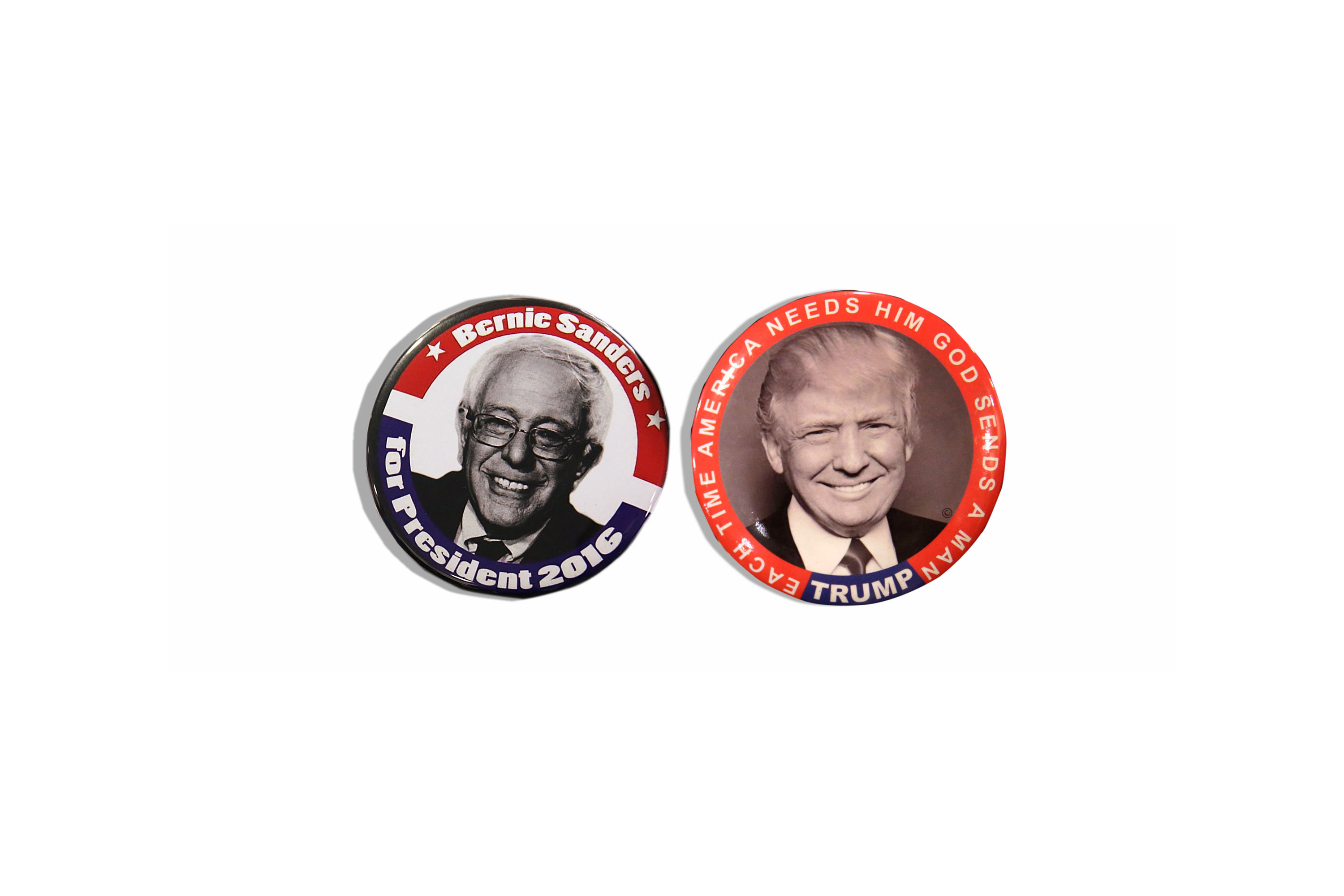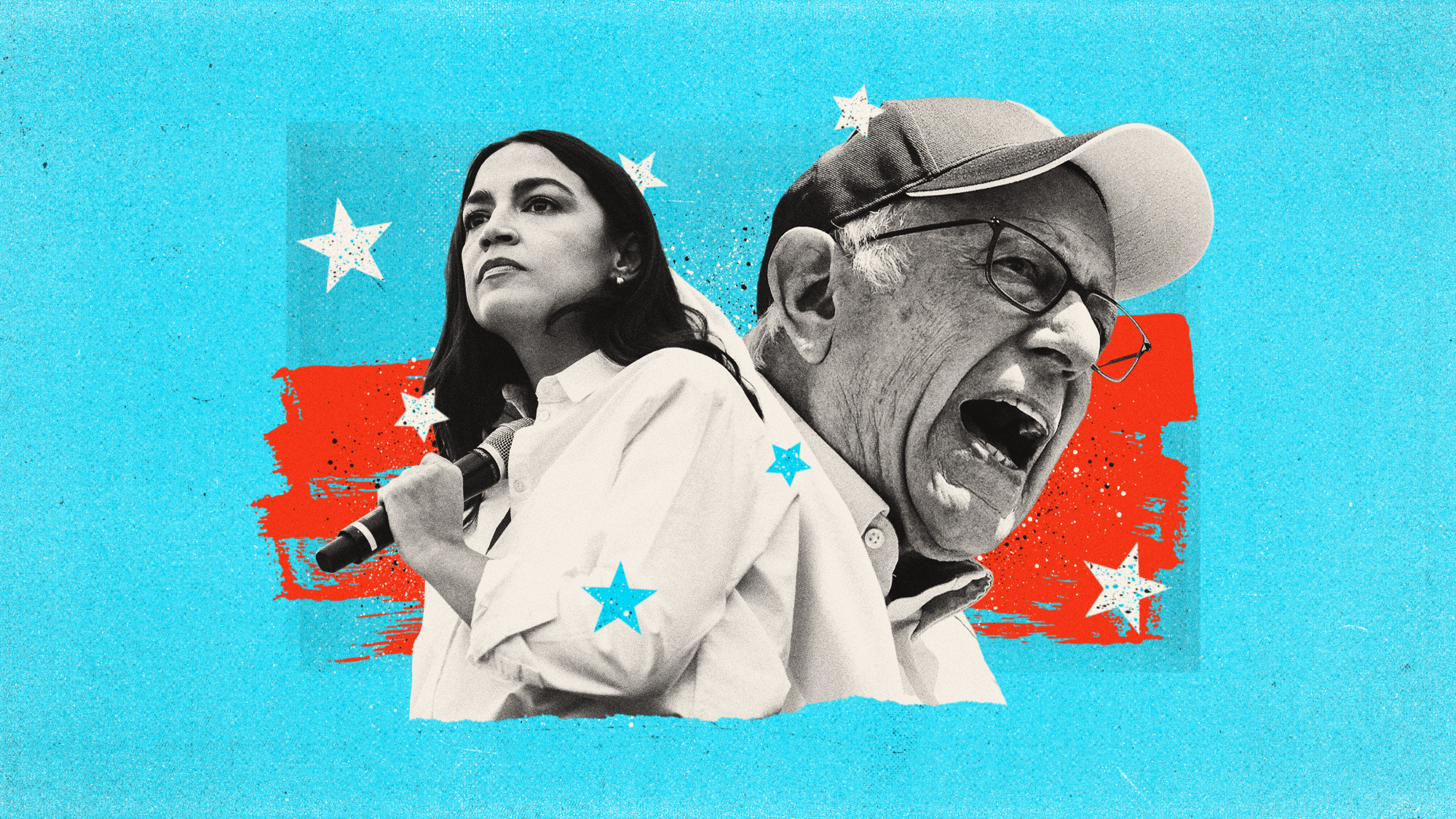Here's the big difference between Bernie Sanders and Donald Trump
Donald Trump and Bernie Sanders are not two sides of the same "anti-establishment" coin. There are two very different political rebellions going on.


A free daily email with the biggest news stories of the day – and the best features from TheWeek.com
You are now subscribed
Your newsletter sign-up was successful
Tuesday's New Hampshire primary represented about as emphatic a rejection as you could imagine of that imposing monolith we've been calling "the establishment." Bernie Sanders certainly felt it. "The people of New Hampshire have sent a profound message to the political establishment, to the economic establishment, and by the way, to the media establishment," he said. "The people want real change." On the Republican side, you could almost hear the establishment whimpering sadly as the possibility of Donald Trump being their nominee became even more real.
But we shouldn't make the mistake of thinking that Sanders' and Trump's success — whether temporary or not — represents two sides of the same coin, a single phenomenon manifesting itself simultaneously in both parties.
That isn't to say there aren't a few similarities between the messages the two men are sending. People joke about Sanders and Trump both being supporters of single-payer health care, even though Trump's "support" consists of a couple of favorable comments years ago; the truth is that he doesn't seem to know or care much about health care, just like most policy issues. But Trump has sounded some economic populist themes, particularly on trade, where he's been as skeptical as Sanders of the free trade policies pursued by Democratic and Republican administrations alike. And Trump has no particular commitment to conservative ideology, so if he does become the nominee, don't expect him to advocate for traditional Republican economic ideas.
The Week
Escape your echo chamber. Get the facts behind the news, plus analysis from multiple perspectives.

Sign up for The Week's Free Newsletters
From our morning news briefing to a weekly Good News Newsletter, get the best of The Week delivered directly to your inbox.
From our morning news briefing to a weekly Good News Newsletter, get the best of The Week delivered directly to your inbox.
That aside, Trump and Sanders have fundamentally different analyses of what's wrong with America and its government, and what ought to be done about it.
Anger has been the signature emotion of this election on the Republican side. And while there's no question that many Democratic voters have problems with what has happened during the Obama years, they're not angry so much as they are disappointed. And that disappointment is really with governing itself — the difficult slog of legislation, the necessary compromises, the inevitable mix of victories and defeats. Hillary Clinton's problem is that she doesn't promise anything different; her point is not that she'll remake American politics, but that through hard work and persistence she can squeeze out of that unpleasant process some better results.
It's a pragmatic, realistic message, but not one to stir the heart. Particularly for idealistic younger voters, Sanders' vision of not just different results but a transformed process was bound to be appealing. To those liberals whose attachment to the Democratic Party is less firm — which may also be true of younger voters — Sanders says that the problem isn't the other side, it's the whole system, and the "oligarchy" that controls it.
Trump too has a message that transcends partisanship. But where Sanders says the problem is that the system is corrupt because it's controlled by the wealthy and corporations, Trump argues that the problem is stupidity. He doesn't want to bring about some kind of transformation in the system. He wants to just ignore it, and produce unlimited winning through the sheer force of his will. For instance, they may both have problems with the trade agreements America has signed, but Sanders will tell you it's because corporations exerted too much influence over the content of those agreements. Trump just says the agreements were negotiated by idiots, so we got taken to the cleaners by foreigners.
A free daily email with the biggest news stories of the day – and the best features from TheWeek.com
Here's another important difference between the two: For all their misgivings about the Democratic establishment, Sanders' supporters are idealistic, hopeful, and looking for dramatic change that is rooted in liberal ideology. They want more comprehensive government benefits in areas like health care and education, higher taxes on the wealthy, and greater restrictions on financial firms. In short, they want their party to be more ideologically pure.
Trump's supporters, on the other hand, aren't motivated by hope and idealism but by anger: anger at immigration, anger at Muslims, anger at foreigners, anger at a changing country that seems to be leaving them behind. They want a restoration of American greatness, the feeling of mastery over events and the world. They are far less interested in fulfilling a wish list of conservative policies — which is why they're unfazed when other Republicans accuse Trump of not being a "real" conservative. He isn't, and his supporters don't really care.
There's another difference: As dramatic as both victories in New Hampshire were, Trump and Sanders face very different prospects from this point forward. Trump is the overwhelming Republican frontrunner, standing far atop a chaotic race in which his opponents are dropping like flies. He may or may not become the nominee, but at the moment he's got a much better shot than anyone else. Sanders, on the other hand, still trails Hillary Clinton in national polls and faces a daunting map. He'll now have to go to states with large numbers of the minority voters among whom Clinton has been particularly strong.
We don't yet know how deep the desire for "revolution" among Democrats really goes, and that question will probably determine the outcome of their primary race. The conservative rage that propelled Donald Trump to victory in New Hampshire, on the other hand, seems virtually inexhaustible.
Paul Waldman is a senior writer with The American Prospect magazine and a blogger for The Washington Post. His writing has appeared in dozens of newspapers, magazines, and web sites, and he is the author or co-author of four books on media and politics.
-
 How to Get to Heaven from Belfast: a ‘highly entertaining ride’
How to Get to Heaven from Belfast: a ‘highly entertaining ride’The Week Recommends Mystery-comedy from the creator of Derry Girls should be ‘your new binge-watch’
-
 The 8 best TV shows of the 1960s
The 8 best TV shows of the 1960sThe standout shows of this decade take viewers from outer space to the Wild West
-
 Microdramas are booming
Microdramas are boomingUnder the radar Scroll to watch a whole movie
-
 The billionaires’ wealth tax: a catastrophe for California?
The billionaires’ wealth tax: a catastrophe for California?Talking Point Peter Thiel and Larry Page preparing to change state residency
-
 Mamdani vows big changes as New York’s new mayor
Mamdani vows big changes as New York’s new mayorSpeed Read
-
 Bari Weiss’ ‘60 Minutes’ scandal is about more than one report
Bari Weiss’ ‘60 Minutes’ scandal is about more than one reportIN THE SPOTLIGHT By blocking an approved segment on a controversial prison holding US deportees in El Salvador, the editor-in-chief of CBS News has become the main story
-
 Has Zohran Mamdani shown the Democrats how to win again?
Has Zohran Mamdani shown the Democrats how to win again?Today’s Big Question New York City mayoral election touted as victory for left-wing populists but moderate centrist wins elsewhere present more complex path for Democratic Party
-
 Millions turn out for anti-Trump ‘No Kings’ rallies
Millions turn out for anti-Trump ‘No Kings’ ralliesSpeed Read An estimated 7 million people participated, 2 million more than at the first ‘No Kings’ protest in June
-
 Ghislaine Maxwell: angling for a Trump pardon
Ghislaine Maxwell: angling for a Trump pardonTalking Point Convicted sex trafficker's testimony could shed new light on president's links to Jeffrey Epstein
-
 The last words and final moments of 40 presidents
The last words and final moments of 40 presidentsThe Explainer Some are eloquent quotes worthy of the holders of the highest office in the nation, and others... aren't
-
 The anger fueling the Bernie Sanders and Alexandria Ocasio-Cortez barnstorming tour
The anger fueling the Bernie Sanders and Alexandria Ocasio-Cortez barnstorming tourTalking Points The duo is drawing big anti-Trump crowds in red states
